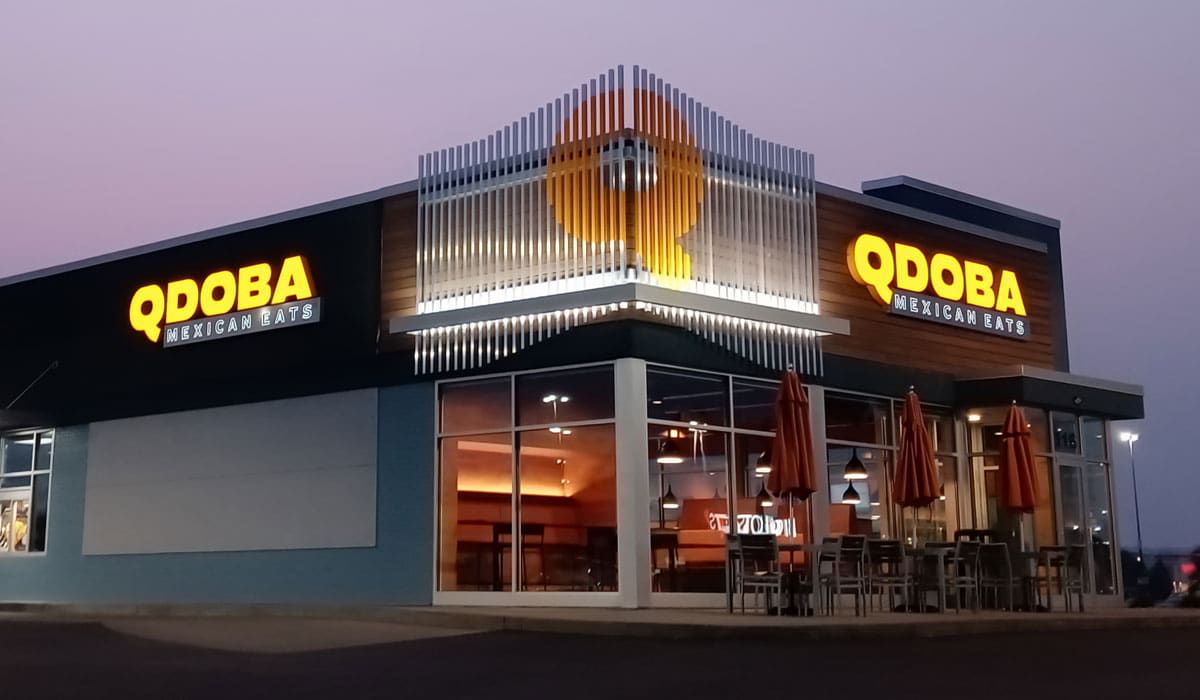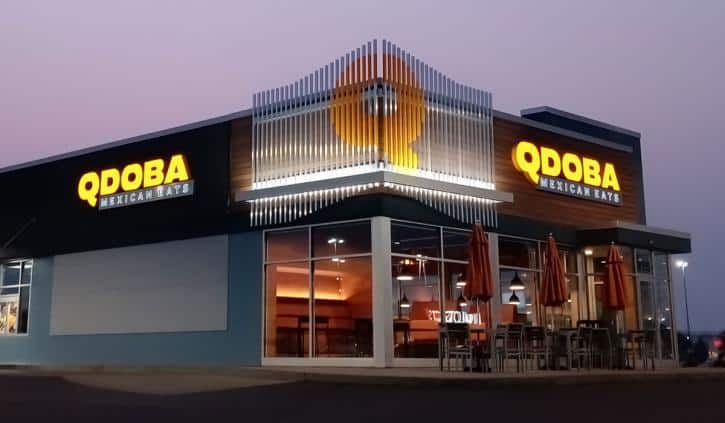
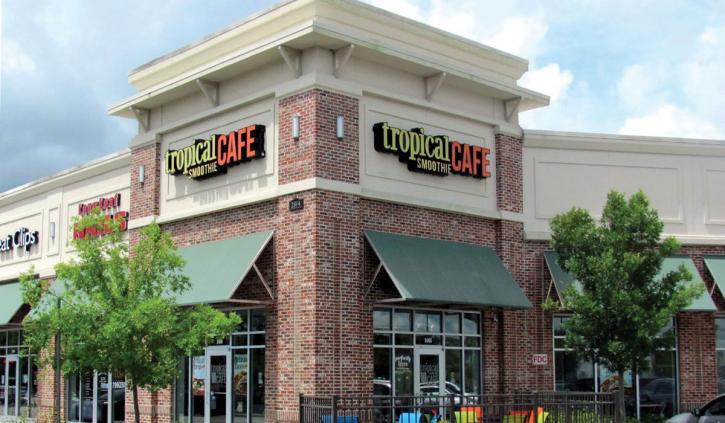
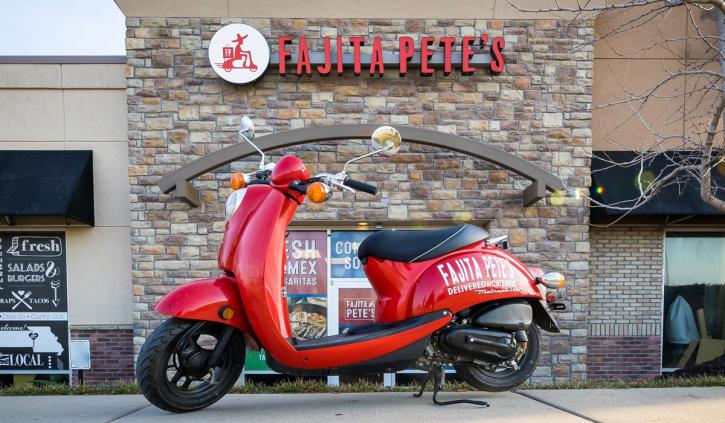
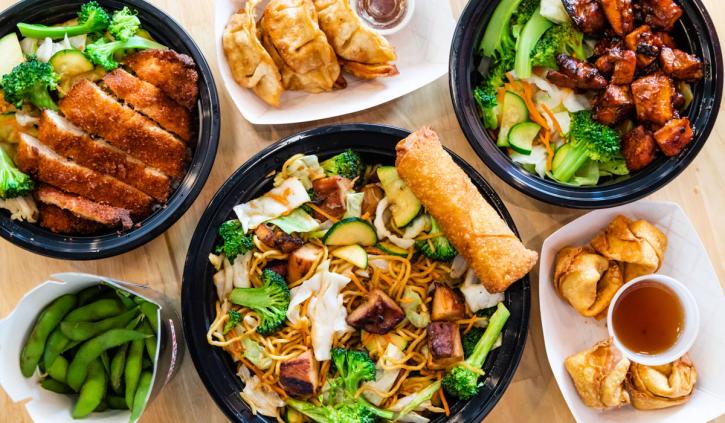
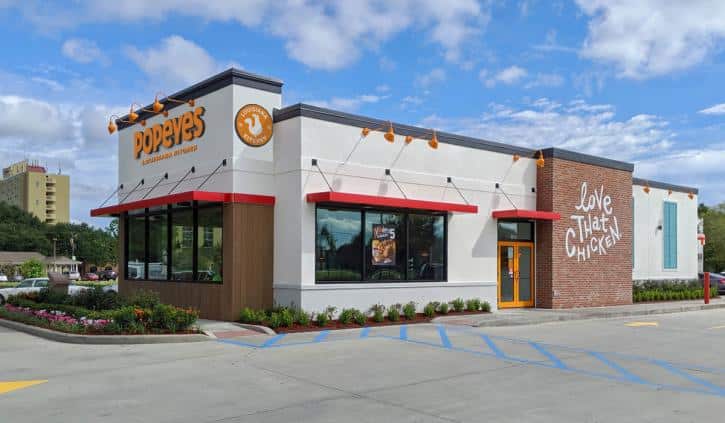
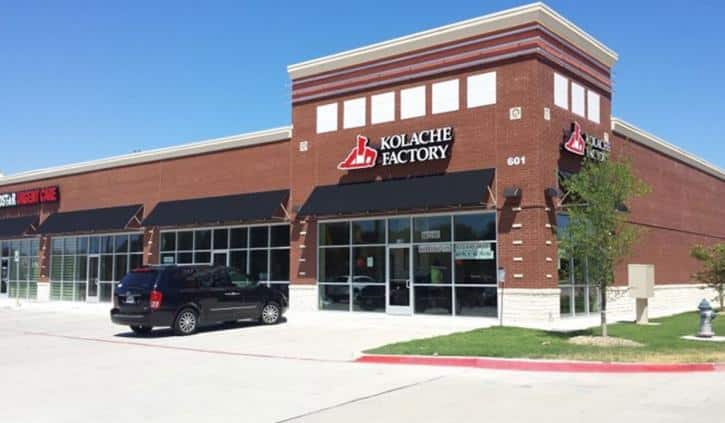
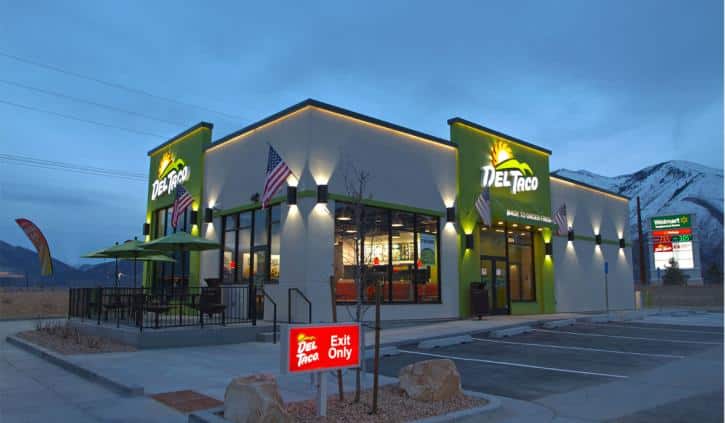
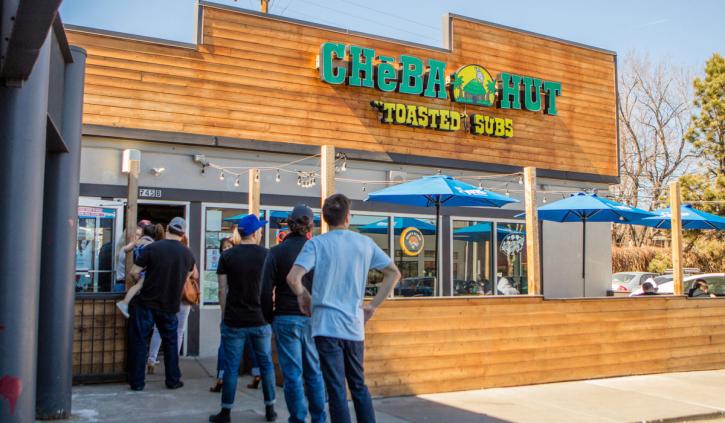
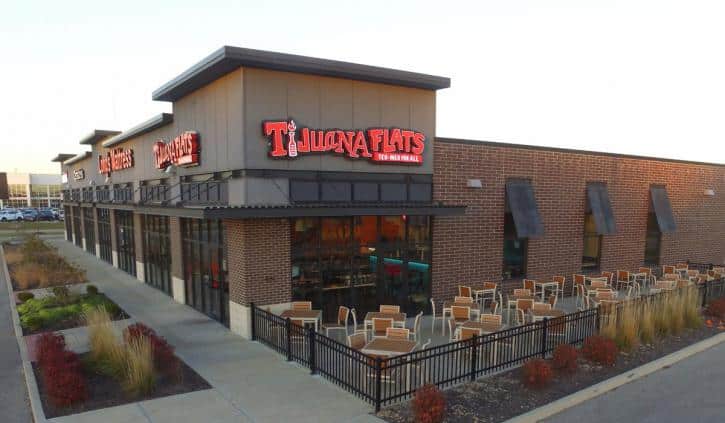
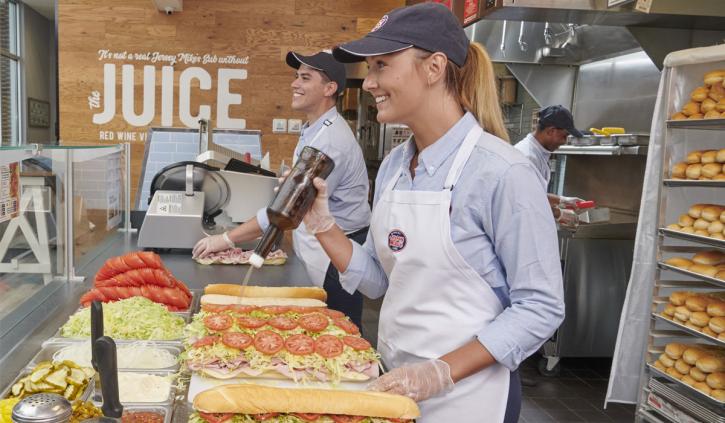
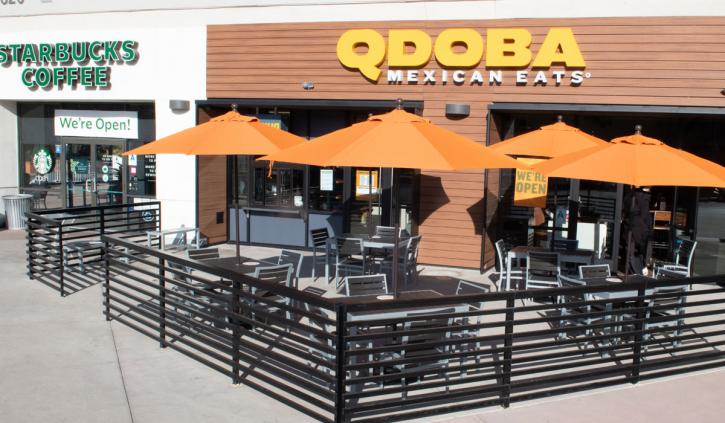
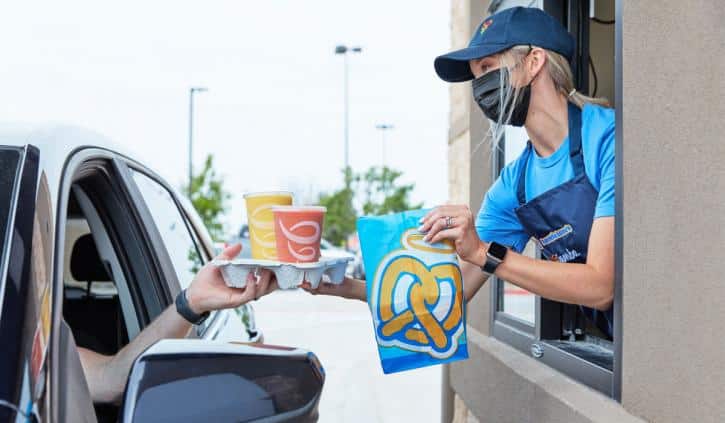
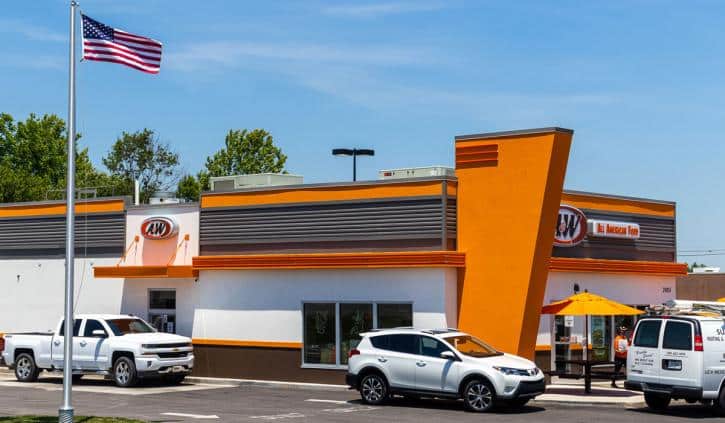
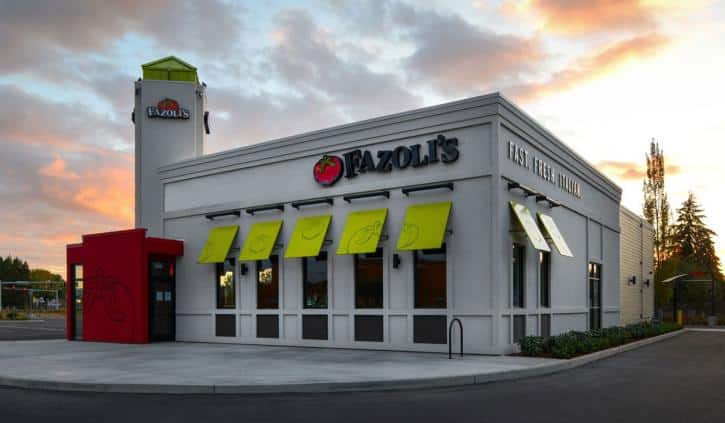
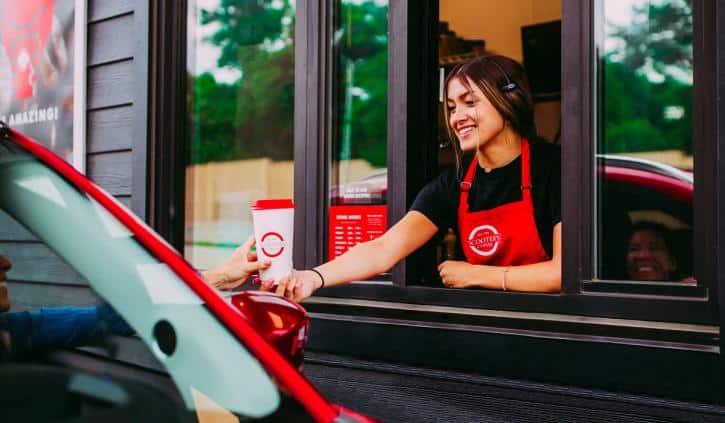

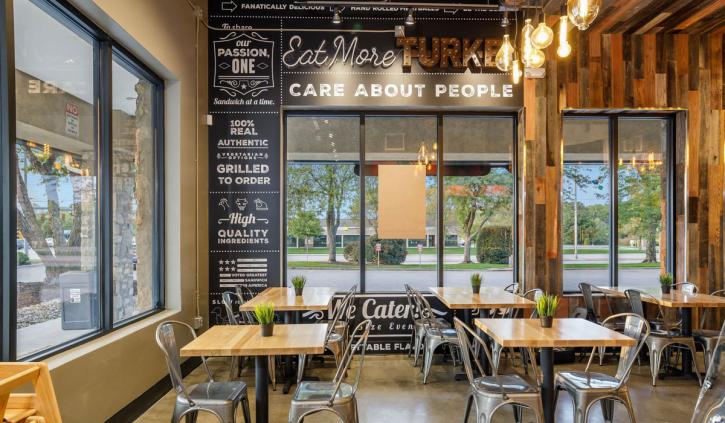
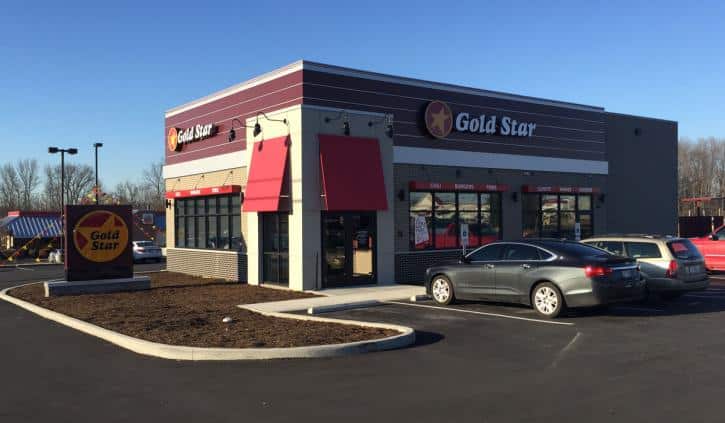
What does anyone look for in a business, franchised or not? They want earning potential, a good model, and stability in the worst of times,” says Mary Ann O’Connell, president of consulting firm FranWise.
Without a doubt, 2020 provided America’s restaurant franchises a chance to prove their mettle. Brands didn’t just have themselves to look out for, but also the collective well-being of vast networks, pipelines, and prospective partners. The good news for quick-service restaurants, however, is that, by and large, the segment proved steadier than its sit-down counterparts. This led many chains to hit the recovery stretch at full gallop, with sales often comping well above 2019 levels. Digital and off-premises expansion. Stimulus in the pockets of consumers. Pent-up demand. All of these dynamics placed a changing and eager guest right in front of restaurants.
In terms of franchising, the market is ripe in a lot of respects. Success during the pandemic helps, naturally, yet so do conversion opportunities, the ability to dive into smaller formats, and large pools of capital raised and horded when the stakes were highest.
CHECK OUT LAST YEAR’S BEST FRANCHISE DEALS
MORE: The Next Frontier of Restaurant Franchising
“What makes a good restaurant franchise investment for the modern-day candidate is one that appeals to the core American palate with room for innovation, has markets still to be developed, strong unit economics, and stronger leadership to innovate and anticipate changes in the economy and consumer spending habits,” O’Connell says.
For this year’s Best Franchise Deals, QSR gathered a panel of franchise experts to review performance, potential, and how brands handled the relationships and rigors accentuated by COVID.
“When helping to identify strong franchise investments to include in this list, we based our decisions on strong franchisee economics with favorable payback periods—looked at AUVs, startup costs, and estimated margins,” says Patrick Galleher, managing partner of Boxwood Partners.
And there’s a wide range of elements to consider in a post-pandemic landscape.
“The best restaurant franchise investment would be a sustainable and timeless concept with strong systems and processes to support growth,” says Diana Park-Alford, national sales manager at digital marketing company RevLocal. “I would be wary of concepts that are too fad-driven or that appear targeted at too specific an audience. Now more than ever, the fundamentals of culture and finance matter—is the mission and culture of your concept strong enough to attract and retain great team members? And will your financials support healthy operations without razor thin margins? A great restaurant franchise investment will be able to check all of these boxes.”
DOWNLOAD OUR EXPANDED BEST FRANCHISE DEALS REPORT
“As much as things have changed, so much remains the same—many of the same brands who were built/prepared for growth and prosperity before the pandemic are the ones who are reaping the rewards as we emerge from it,” adds Graham Chapman, VP of account services at 919 Marketing. “These are the companies with relatable brands, craveable food, and visionary executive leaders. Of course, modern-day candidates need to review the FDD/item 19, validate what they’re hearing with active franchisees, and ensure the numbers make sense. But none of that matters if the brand, the food, and/or the leadership team is uninspiring.”
So while the global health crisis shifted everything, much of what made restaurants tick hasn’t moved as much you might think. You could carry that mindset over to franchising as well.
Brands that backed operators, gave them incentives to expand, and provided a working model to generate profit, outlasted the steepest challenges. “Today’s restaurant consumer is seeking fresh food and fresh ideas. As an investment, I’d look for great branding, a focus on food quality, a bright and fun environment, and strong operational support,” says Dave Pazgan, founder of ZorForum, a peer group organization exclusively for leaders of growing franchise networks.
“There are several criteria to consider when investing in a restaurant franchise,” continues Stan Friedman, president of FRM Solutions, an acronym that stands for Franchise Relationship Management, and the host of the Franchise Today podcast. “Some of these are subjective, i.e. your past experience, your net worth and liquidity, and/or your access to capital. However, some criteria are fundamental. Chief among these, in today’s post-COVID world, would include investing in brands that have committed to technology both in the front and back of the house—those that have clearly demonstrated their trustworthiness, as can be attested to, by how they navigated through the pandemic, internally as well as with their franchisees, their front-line teams and consumers.
As always, brands with strong unit-level economics on both the top and bottom lines, that
also possess desirable sales to investment ratios [average of at least 2:1] Lastly, brands possessing a strong culture of ‘people first,’ brands that walk the talk, and properly manage well aligned expectations.”
Alex Oswiecinski, founder of lead generation company Prospect Direct, kept it simple when describing what makes a good target today. “A restaurant concept that produces higher than average cash flow, is fun to run, and can scale to multi-unit ownership.”
Here are this year’s 17 Best Franchise Deals for 2021.
If viewing on desktop, please click the arrows in the photos to continue.
Note: This year’s list was chosen and deliberated on by an expert panel of franchise experts. It included: Mary Ann O’Connell, president of FranWise; Patrick Galleher, managing partner, Boxwood Partners; Alex Oswiecinski, CEO/founder, Prospect Direct; Diana Park-Alford, national sales manager, RevLocal; Stan Friedman, president, FRM Solutions and host of the Franchise Today podcast; Graham Chapman, VP account services, 919 Marketing; Dave Pazgan, founder, ZorForum; and Andy Lapin, partner and real estate attorney at Robbins, Salomon & Patt, Ltd.
Tropical Smoothie Cafe
Total U.S. units: 914
U.S. franchise units: 913
System-wide sales: $690,453,606
Franchise AUV: $840,622
Total AUV: $840,622
Franchise fee: $30,000
Total start-up costs: $257,500–$560,500
Royalty: 6 percent
Renewal fee: None
Marketing fee: 3 percent
Other fees: Local advertising; cooperative contribution: a minimum of 2 percent of gross sales; back of house: $145 implementation fee, $179 monthly subscription; online ordering: $55 per month; managed firewall: $103 per month per restaurant; mobile app: $75 per month.
The skinny:
Tropical Smoothie opened its milestone 900th location in 2020, and in total, debuted 99 cafes and signed 254 franchise agreements. About 70 percent of the brand’s growth comes from existing franchisees. Also, the brand experienced same-store sales growth of 7.5 percent, marking nine consecutive years of positive comps. Tropical Smoothie’s AUV is currently the highest in its 24-year-history, with the top 50 percent reporting figures north of $1 million. It’s looking to achieve an AUV of $1 million for all cafes with a total of 1,500 restaurants in the next five years.
Sizing up from the sidelines:
“Good times and hard times, they kept growing in sales and numbers. The culture is infectious fun and respectful, and maybe that is why they added 80 franchise units in 2020.”
“Given the volume of franchise locations, it’s clear that TSC represents a repeatable model and the financial representations look promising for a day-part concept.”
“Closing in on 1,000 units, this brand is highly regarded for it’s great leadership and culture. Steady, measured growth with strong sales to investment ratio, keep TSC standing out in its segment, while accelerating growth in its target markets.”
What you get for your investment:
Initial franchisee fee: $15,000–$30,000
Professional fees: $6,500–$15,500
Restaurant fixtures, furniture, and equipment (including point of sale/cash register system): $76,500–$134,000
Leasehold improvements: $143,500–$260,500
Signage: $4,000–$13,000
Initial inventory: $4,500–$18,500
Initial training expenses: $500–$9,000
Initial deposits: $1,000–$17,000
Grand opening contribution: $5,000–$10,000
Additional funds (working capital): $1,000 to $53,000
Incentives to target:
Tropical Smoothie is a member of the IFA and participates in the VetFran program, which provides financial incentives to qualified veterans to help them acquire franchised businesses. In support of this program, Tropical Smoothie currently reduces the initial franchise fee for qualified veterans to $15,000 for the first and each subsequent franchised business developed. Currently, more than 50 Tropical Smoothie Cafe locations are owned by veterans who have taken advantage of the VetFran program.
In addition, Tropical Smoothie and its area developers, on occasion, use incentive referral programs for existing operators and employees, as well as vendors, to refer franchise prospects. Under these programs, Tropical Smoothie may pay cash compensation or provide other benefits and inducements for the referral of qualified prospects. In many cases, the compensation or benefit will not be paid unless the franchise prospect enters into an agreement with Tropical Smoothie. These programs may be altered, modified, suspended, or terminated at any time. And the referral program is available in all states, with the exception of the state of Washington.
Fajita Pete’s
Total U.S. units: 19
U.S. franchise units: 16
System-wide sales: $11,232,144
Franchise AUV: $774,309
Total AUV: $864,011
Franchise fee: $35,000
Total start-up costs: $202,500–$460,200
Royalty: 5.5 percent
Renewal fee: 50 percent of franchise fee
Marketing fee: 1 percent
The skinny:
Fajita Pete’s has agreements for new locations that will expand its unit count to 75 stores within the next four years. It boasts an efficient footprint of 1,200 to 1,500 square feet and a simple, focused menu. These are the brand’s two bedrocks, executives say. Additionally, Fajita Pete’s focuses on to-go, delivery, and catering, with minimal (two to three tables) on-premise dining. It can operate in small locations with minimal rent and construction costs. Similarly, a catering-focused kitchen and streamlined menu of fresh, high-quality Tex-Mex items (just five core ingredients) and to-go margaritas minimizes food waste and requires fewer employees in the kitchen, resulting in lower food, operating, and labor costs. Completing the picture is a high average check due a target audience of families of three or more. And this is a concept on the rise. The vast majority of Fajita Pete’s franchise sales occurred in 2020. Because online ordering, curbside pickup, and delivery were already cornerstones of the business, there was no need to pivot.
Sizing up from the sidelines:
“The model is already built toward catering and delivery. Restaurants are small footprints and do not require tons of labor. Limited, well-structured menu—not a huge concernfor supply-chain issues.”
What you get for your investment:
Trade area and/or site analysis: $1,000–$1,500
Lease (first three months’ rent), utility & security deposits: $10,000–$13,700
Business licenses and permits: $3,000–$7,500
Construction drawing, architect, engineering fees: $8,500–$11,500
Leasehold improvements: $56,000–$225,000
Furniture, fixtures, equipment: $45,000–$79,500
Professional fees: $2,000–$5,000
Initial inventory of food, beverages and supplies: $3,000–$5,000
Insurance deposit: $1,000–$2,000
Training expenses: $5,000–$12,000
Grand opening advertising: $3,000–$8,000
Incentives to target:
Fajita Pete’s is committed to teaching and supporting franchisees. Support includes: Site selection and lease negotiation: Provide professional, data-driven assistance in helping to locate and identify suitable Fajita Pete’s locations.
Restaurant design and construction: Based on its prototype, complete sets of custom floor plans are developed for each location that prioritize creating proper customer traffic flow, seating, efficient work areas, and storage. Training and operations manual: Multi-week, in-person and on-site training with Fajita Pete’s owners and operators.
Teriyaki Madness
Total U.S. units: 88
U.S. franchise units: 88
System-wide sales: $60,820,458
Franchise AUV: $1,079,488
Total AUV: $1,079,488
Franchise fee: $45,000 for one license; $99,000 for three licenses; $150,000 for five licenses
Total start-up costs: $327,200–$678,260
Royalty: 6 percent
Renewal fee: 10 percent of the brand’s then-current initial franchise fee, per Teriyaki shop
Marketing fee: 3 percent
The skinny:
Systemwide revenue is up 48 percent compared to 2019. Teriyaki Madness increased sales 45 percent for pre-pandemic grand openings in 2020 versus 2019 and also boosted sales 39 percent for post-COVID grand openings last year. Perhaps most notably, the fast casual says it’s about to skyrocket growth, with 45–50 new stores on deck for 2021. To support the boom, Teriyaki Madness increased corporate staff 50 percent and brought in 27 new hires. A sign of the optimism—78 percent of franchisees are pursuing additional locations, the company said. There’s also a fully absentee opportunity if the franchisee wants to use “Restaurant Sherpas” to run locations. This program was introduced last June. The affiliate restaurant management company works exclusively for Teriyaki Madness. As noted, it works especially well for absentee and semi-absentee franchisees who want a turn-key solution, providing a viable business opportunity for operators looking to secure investor visas like EB5 and E2, or who want to be part of the brand without running the day-to-day operations. After taking over a Wheat Ridge, Colorado, location, average daily sales rose 19 percent and average meal tickets 29 percent, with year-over-year sales climbing 42 percent that August.
Sizing up from the sidelines:
“Convenient and on-trend with on-the-go lifestyle. Simple menu and model allows franchisees to scale multi-unit. Solid unit-level sales.”
“The efficiencies of Teriyaki Madness’ delicious food kept it going and growing.”
“The Teriyaki bowl/hibachi bowl concept is not oversaturated, and I think there is room in the market for this concept. The menu has enough variety to encourage repeat customers, without being overwhelming from an operational perspective. Financials look promising—based on the information provided it looks like the concept is built well to operate within generally accepted industry standards for things like COGS, labor, etc.”
“Fast-growing concept filling a critical void in franchise fast casual [fresh Asian food that’s crazy delicious]. Their AUV’s double the initial investment and their profitability can reach 25 percent in a segment poised to explode as people head back out in the world post-COVID and crave new/different food.”
What you get for your investment:
Initial franchise fee
Shop opening assistance fee
Site investigation; Site survey
Rent, security deposit, utility deposit
Permit expenditor
Leasehold improvements
Furniture, fixtures, and equipment
Architect
Initial inventory and supplies
Insurance
Business licenses and permits
Professional fees
Signage; Security and music system
Office equipment and supplies
Grand opening promotion
Uniforms
Initial and hands-on training
Additional funds—three months
Initiation payment under optional restaurant management agreement (optional)
Management services fee under optional restaurant management agreement (optional)
Incentives to target:
Military veteran discount of 15 percent off franchise fee.
Popeyes
Total U.S. units: 2,634
U.S. franchise units: 2,593
System-wide sales: $5,143,000,000
Franchise AUV: $1,940,000
Total AUV: $1,940,000
Franchise fee: $50,000
Total start-up costs: $423,800–$3,545,800 (free standing); $383,500–$1,362,800 (in-line); $109,500–$749,300 (delivery)
Royalty: 5 percent
Renewal fee: $50,000
Marketing fee: 4 percent national ad fund
Other fees: 1 percent local ad fund co-op
The skinny:
In 2019–2020, Popeyes posted four of the best quarterly same-store sales percentage increases in the quick-service industry in the last 10 years. To put it mildly, Popeyes is one of the hottest concepts in America, and has been since its chicken sandwich landed in August 2019. In the past two years (using Q1 as a measuring stick), Popeyes’ comps are up 27.7 percent. Perhaps most alluring to franchisees, the brand’s AUVs lifted roughly $400,000 from pre-chicken sandwich to today. The brand ended 2019 with AUVs closer to $1.54 million. Popeyes also just launched its first loyalty program and recently started to plot international growth on a reenergized scale. Popeyes’ momentum rests on steadfast traits, too, like a culinary team led by award-winning chef Amy Alarcon, and the brand’s commitment to all-natural, hormone free, antibiotic-free food products by 2022. It also boasts analytic-driven and hands-on marketing and operations support teams that aim to constantly connect with franchisees and customers, the company said. And it expects to prioritize investments in digital infrastructure to remain at the forefront of technology in the industry. One being a drive-thru and menuboard refresh that follows a similar project at sister brands Burger King and Tim Hortons.
Sizing up from the sidelines:
“Many claim to have won the chicken sandwich wars [and more contestants seem to appear daily], but Popeyes was/is the clear winner. The Popeyes chicken sandwich dominated the news current/social channels and helped the brand post four of the best quarterly same-store sales percentages increases in the [quick-service] industry over the past 10 years. The sales figures, constant innovative menu additions, and overwhelming amount of consistent media coverage/social engagement make this a great opportunity.”
“Popeyes’ boneless chicken sandwich boosted unit sales with continuing accelerated growth as a result of COVID-19’s emphasis on drive-thru and online ordering. Additionally, consolidation of unit ownership in growth oriented franchisees provides fresh capital for reimaging and additional store development for the brand.”
What your investment gets you:
Franchise fee
Soft costs (legal, accounting, administrative, architectural, permitting, design, etc)
Site work; Building
FF&E, signage, and technology
Initial training
Opening supplies
Insurance
Utility deposits
Business licenses
Working capital
Incentives to target:
Popeyes offers a veterans development incentive program. New qualified veteran franchisees may be eligible for a reduced initial franchise fee from $50,000 to $27,500, as well as a reduced royalty from 5 percent of gross sales to 2 percent of gross sales for a period of six months following the opening date of the franchised restaurants.
Additionally, there’s a women and minorities development incentive program. There, operators could receive a reduced initial franchise fee from $50,000 to $27,500; or a reduced royalty from 5 percent of gross sales to 2 percent of gross sales for a period of six months following the opening date of the franchised restaurants.
Kolache Factory
Total U.S. units: 55
U.S. franchise units: 28
System-wide sales: $35,709,169
Franchise AUV: $587,344
Total AUV: $605,240
Franchise fee: $44,900
Total start-up costs: $431,900–$709,400
Royalty: 6 percent
Renewal fee: None
Marketing fee: 3 percent
The skinny:
The concept’s Czech-inspired, handheld pastries are designed for large parties or as on-the-go snacks, and have an affordable price point. They’re made fresh daily and the semi-sweet yeast dough is filled with a variety of fruits, meats, and cheeses. The family-run company was founded in 1982, and with breakfast and lunch hours, is an ideal franchise for someone seeking flexibility. The small retail footprint keeps overhead down so operators can focus on execution.
Sizing up from the sidelines:
“Really impressed by their response to the coronavirus pandemic with the Kolache Cares program—a proactive and thoughtful idea that sends the right message while creating more business for franchisees. Great family brand out of Texas serving up a delicious product perfect for an ‘on the go’ meal for breakfast or lunch. Good upside as well as top-performing stores nearly double the initial investment in annual revenues.”
“Because kolaches are not exceedingly complex to create, and do not require a large staff and lots of expensive equipment to prepare, these bakery-cafés delivers a higher yield per square foot through operating efficiencies. These include lower materials and equipment costs, and reduced labor. Perfect for the post-COVID economy and for those seeking something different in food that offers flexibility.”
What you get for your investment:
The franchise fee
Rent; Uility deposits
Architectural engineering
Permitting and legal fees
Leasehold improvements
Cabinetry, equipment, and furniture
POS system
Initial marketing expenses and grand opening expense
Signage
Manager and personnel training
Initial inventory, office supplies, and uniforms
Freight, gift cards
Three months working capital
Del Taco
Total U.S. units: 596
U.S. franchise units: 301
System-wide sales: $857,444,440
Franchise AUV: $1,407,877
Total AUV: $1,516,021
Franchise fee: $35,000
Total start-up costs: $859,700–$204,100,500
Royalty: 5 percent
Renewal fee: $35,000
Marketing fee: 4 percent
The skinny:
Del Taco has been around 55 years and says it’s well-positioned to grow in an underdeveloped category. With a new “Fresh Flex Design” and “Menu of Venues” that touts building prototypes from 1,200 to 2,400 square feet, it offers franchise partners the flexibility needed to build stores that fit the needs of their trade area. The brand reported first-quarter systemwide sales growth of 14 percent at franchise restaurants versus 2020. For fiscal year 2020, franchised same-store sales increased 1.4 percent, year-over-year. Del Taco also continues to operate nearly half of the system’s restaurants, creating alignment with franchisees on strategies to drive top- and bottom-line results. With locations in 16 states, the company has whitespace to grow.
Sizing up from the sidelines:
“I think Del Taco could be ripe for new geographies—the menu speaks to modern dining preferences with a variety of options and a focus on fresh.”
What you get for your investment:
Promotional fee
Professional Fees
Lease payment
Building, site work, and entitlement
Architectural engineer; FF&E
Computer systems
Tech support fee
Insurance; Initial training, crew training
Working capital
Inventory
Licenses, fees, and deposits
Incentives to target:
Military veteran discount of 15 percent off franchise fee.
Growth Incentive Program: The developer enters into a development agreement for a specific new market as determined by the Del Taco development department with a minimum five-store commitment. A, the first two restaurants opened before the deadlines described above receive the following incentives: Del Taco shall waive $20,000 of the $35,000 initial franchise fee as required in the franchise agreement (franchise fee will be $15,000). B, all of the restaurants that are committed to on the original development agreement and are opened before the deadlines described above receive the following incentives: Royalty fees shall be reduced for three years according to the following: Del Taco shall collect royalty fees of 2 percent year one, 3 percent year two, 4 percent year three, and 5 percent in years four and beyond.
Cheba Hut
Total U.S. units: 40
U.S. franchise units: 39
System-wide sales: $48,000,000
Franchise AUV: $1,800,000
Total AUV: $1,800,000
Franchise fee: $85,000 for three stores
Total start-up costs: $700,000
Royalty: 4 percent for first 12 months, 5 percent thereafter
Renewal fee: $20,000
Marketing fee: 2 percent
Other fees: Tech fee of $420 per month; real estate and construction fee per store of $10,000
The skinny:
Cheba Hut and its offbeat vibe is on pace to do $66 million in systemwide sales in 2021, with AUVs of $1.75 million. And it thrived during 2020 despite not having a drive-thru.
The fast casual boasts a full bar at most locations and an established and thriving tech stack, including a new app that launched in January. It was built from scratch and includes two main features—10 cents back to the customers for every dollar they spend and a one-of-a-kind in-app mobile game that provides bonus loyalty points that the customer can exchange for grub and gear. The marijuana-inspired sandwich franchise offers more than 30 signature sub sandwiches, in addition to a variety of Rice Krispy treats, salads, and munchies.
Sizing up from the sidelines:
“Innovative vibe, look, and feel inside stores. Unique concept that is differentiated within niche. Great tasting product and menu variety. Authentic and fun brand identity is well defined.”
What you get for your investment:
Initial Franchising fee: $40,000
RECON assistance fee: $15,000
Furniture, fixtures, decor, and equipment: $140,000–$170,000
Pre-opening technology fee: $1,200–$1,800
Opening team expenses: $6,000 (as incurred)
Training expenses: $15,000–$18,000
Architectural and engineering fees: $15,000–$22,000
Site survey fee: $2,000–$3,500
Signs: $6,500–$20,000
3 months lease payments: $16,500–$30,000
First party: $3,500
Additional funds (three months): $45,000–$60,000
Initial inventory: $6,000–$10,000
Professional fees: $5,000–$10,000
Liquor license: $2,000–$10,000
Tijuana Flats
Total U.S. units: 130
U.S. franchise units: 20
System-wide sales: $138,820,843
Franchise AUV: $1,263,000
Total AUV: $1,200,000
Franchise fee: $35,000
Total start-up costs: $490,000–$750,000
Royalty: 5 percent
Renewal fee: 50 percent of then-current fee
Marketing fee: 1.5 percent
The skinny:
Tijuana Flats recently began showcasing a new prototype, as well as a revamped curbside pickup program and digital menuboards. The store features order status boards linked directly to the kitchen so guests can see order statuses in real time. Units will now be equipped with a digital ticker display that shows everything from the latest news headlines to food and drink specials. The first of Tijuana Flats’ new designs opened late 2020 in Noblesville, Indiana. Remodels as well as new openings are in the works. The brand is exploring mobile-order pickup windows, too. Tijuana Flats franchising program is back after a 13-year pause.
Sizing up from the sidelines:
“After halting franchise development efforts for multiple years as they refined the model/investment, Tijuana Flats is ready to grow quickly and sustainably. Led by a phenomenal restaurant industry veteran [Brian Wright, formerly of Au Bon Pain, Bertucci’s, and others] and a passionate/dedicated corporate team, Tijuana Flats is ready to take off. Beyond the awesome food, each franchise owner is able to tweak the interior design so it fits the local community more appropriately [i.e. Florida Gators theme in Gainesville, Florida] and the environment resonates with customers.”
What you get for your investment:
Initial Franchising fee: $35,000
Leasehold improvements: $195,000–$325,000
Operating assets: $172,000–$275,000
Signage: $6,100–$19,000
3 months rent: $18,000–$36,000
Security deposit: $6,000–$11,500
Opening inventory: $5,000–$10,000
Grand opening marketing: $15,000–$20,000
Training expenses: $1,500–$7,000
Miscellaneous opening costs: $10,000–$15,000
Utility deposits: $250–$2,500
Business licenses, including liquor license: $200–$10,000
Insurance: $4,000–$10,000
Additional funds (3 months): $25,000–$50,000
Jersey Mike’s
Total U.S. units: 1,854
U.S. franchise units: 1,840
System-wide sales: $1,595,000,000
Franchise AUV: $936,000
Total AUV: $936,000
Franchise fee: $18,500
Total start-up costs: $169,001–$804,045
Royalty: 6.5 percent
Renewal fee: None
Marketing fee: 5 percent
Other fees: $387 monthly is an all-encompassing technology package, which includes monthly software license fee and support package for POS, including all currently provided software programs, licensing fees, software upgrades, help desk, secure network fee for credit card processing and transferring of sales data, and gift card program.
The skinny:
Earlier in 2020, Jersey Mike’s pledged to pay for all franchisees’ upcoming retrofits—at $75,000 per store, roughly a $150 million investment in its system. The company also introduced the Coach Rod Smith Ownership Program; named after founder Peter Cancro’s youth football coach (and a local bank executive) who gave him a $125,000 loan to purchase Mike’s Subs, the program gives managers throughout the Jersey Mike’s system an opportunity to become store owners with financial and training support. And now the chain is about to complete a reimage of 1,800 restaurants in less than two years. But beyond those innovative programs, this is simply one of the fastest-growing systems in all of the country. Jersey Mike’s grew by net 189 locations from 2019 to 2020, which was third only to Starbucks (287) and Domino’s (229) among the top 50 highest-grossing counter-service brands in the U.S. This after expanding by 173 stores the year before and 150 the calendar before that. Throughout growth, culture remains the cornerstone. During Jersey Mike’s annual Day of Giving this year (where owners give 100 percent of all sales in the last Wednesday of March), franchise owners donated $15 million to 200 local charities around the country.
Sizing up from the sidelines:
“Jersey Mikes added 190 units and has some of the most comprehensive training I have seen recently.”
“Historically, this brand has continued to build upon doing the right things, with the right people, for the right reasons, and has done so steadfastly, with uncanny consistency. Simply stated, the numbers work and their culture is rich in caring, sharing and giving back. What starts at the top permeates throughout the organization. Pair that with a great product and you’ve defined the magic of Jersey Mike’s. From corporate to franchisees, then franchisees to consumers and communities, mutual respect and accountability for the brand they have collectively built, is the unique secret sauce behind its longstanding success.”
What your investment gets you:
Initial franchise fee
Real estate and construction fee
Rent/lease, CAM/taxes/lease, and
utility security deposits
Architectural fees
Leasehold Improvements
Equipment/furniture/small wares
Initial inventory
Insurance
Training
Grand-opening advertising, exterior
signage, interior branding/graphics,
and uniforms
Office equipment and supplies,
TVs/stereo system/security system,
POS system, POS system connection
to private network
Professional fees
(lawyer, accountant, etc.)
Business licenses and permits
Additional funds/working capital for
three months.
Incentives to target:
For existing franchise owners who qualify, there is an “Experienced Franchisee Program” in which the franchise fee is reduced by $10,000 and the real estate and construction fee is waived.
QDOBA
Total U.S. units: 750
U.S. franchise units: 406
System-wide sales: $787,500,000
Franchise AUV: $1,049,000
Total AUV: $1,086,000
Franchise fee: $30,000
Total start-up costs: $475,500–$1,095,000
Royalty: 5 percent
Renewal fee: Greater of 15 percent of the current franchise fee, or $5,000
Marketing fee: 1.25 percent
Other fees: Local advertising 1.75 percent gross sales (not paid to QDOBA, but required). License Fee is $15,000 (for license locations only).
The skinny:
QDOBA has a presence in 47 states, with flexible traditional and nontraditional formats to keep the growth going. It appointed industry vet Jim Sullivan (a former leader in the CKE Restaurant system) chief development officer in June and Shawn Caric as VP of franchise development in May. So an expansion push is clearly coming. Caric, formerly director of development for the Midwest region at Dunkin’ Brands, will help take QDOBA’s suite of options to new and existing markets. This includes concepts designed to grow off-premises, from ghost kitchens and smaller takeout footprints made with dense urban areas in mind. Drive-thrus can enter spaces as small as 1,200 square feet.
Sizing up from the sidelines:
“QDOBA is a nimble, market-driven brand that has adjusted well to an ever-changing world and evolving marketplace. Continued growth through COVID and ease of access for customers with a variety of formats have helped. Drive thrus, curbside, and pickup windows. Respectable numbers on top and bottom lines and a strong culture of giving back have historically kept this brand in the top quartile of successful quick-serves, as they continue their significant growth with a focus on proven and successful multi-unit operators.”
What your investment gets you:
Franchise fee
Development costs
Furnishings, fixtures, equipment, signage, IT, and other systems
Opening inventory
Grand-opening advertising
Insurance
Business licenses and permits
Auntie Anne’s
Total U.S. units: 1,197
U.S. franchise units: 1,185
System-wide sales: $349,622,344
Franchise AUV: $406,742
Total AUV: $408,460
Franchise fee: $35,500 (shop); $10,500 (concession shop)
Total start-up costs: $143,550–$503,000 (shop); $100,550–$253,500 (concession shop)
Royalty: 7 percent
Renewal fee: 20 percent of the then-current initial franchise fee
Marketing fee: 1 percent for shops located in other locations; 3 percent of net sales for shops located in street-side locations.
The skinny:
To continue growing, 33-year-old Auntie Anne’s will look at nontraditional venues such as airports, train stations, travel centers, military bases, and universities as things begin to return to normal following the pandemic. Additionally, Auntie Anne’s will continue to open standalone and street-side locations in the right markets and has launched a number of food trucks to help build accessibility and bring pretzels to people across the country. The brand also put resources into catering and delivery to help build franchisee sales. Another thing to consider—as part of FOCUS Brands, Auntie Anne’s has the opportunity to co-brand and even tri-brand with other specialty concepts within the portfolio, including Carvel, Cinnabon, and Jamba. As an example, in May 2021, Auntie Anne’s debuted a co-branded location with Jamba in Wylie, Texas, which features the first Auntie Anne’s drive-thru.
Sizing up from the sidelines:
“A legacy brand with excellent name recognition, Auntie Anne’s seems poised to capitalize in a post-COVID world. They’re thinking ahead and expanding their real estate focus to target conversion-style locations in well-trafficked, non-traditional areas [airports, train stations, travel centers, universities, etc.] as we ‘return to normal.’ Co-branding with Carvel, Cinnabon, Jamba, etc. gives franchisees excellent opportunities to capitalize on other dayparts/consumer tastes as well.”
What you get for your investment:
Initial franchise fee
Construction and Build Out Costs
Permitting
Equipment Package
Millwork
Furniture
Menuboard graphics and interior design
Exterior signage
Computer system and software training
Smallwares
Architect/engineer
Rent
Grand opening marketing
Legal and accounting fees
Insurance
Misc. opening costs/office supplies
Security deposits
Travel and living expenses during training
Opening inventory
Additional funds for three months
And if concession shop, purchase of a food truck or trailer
Incentives to target:
For the second and any additional franchise purchased, Auntie Anne’s reserves the right to reduce the franchise fee. This second shop incentive program does not apply to satellite retail unit or Pretzel Bike unit. The franchisee/industry contact lead referral program offers $5,000 for a Shop and $1,000 for a concession shop. The chain participates in the International Franchise Association’s VetFran program, and for qualified veterans or members of the Armed Forces, the initial franchise fee is $20,000.
A&W Restaurants
Total U.S. units: 541
U.S. franchise units: 538
System-wide sales: $235,331,846
Franchise AUV: $1,100,600 (freestanding with drive-thru)
Total AUV: $1,100,600
Franchise fee: $12,000–$30,000 (depending upon type and number of units)
Total start-up costs: $276,000–$1,454,750
Royalty: 5 percent
Renewal fee: $2,500
Marketing fee: 2–5 percent
The skinny:
A&W claims to be the only quick-service chain 100 percent owned by franchisees (in 2011, a core group of franchisees purchased A&W, nine years after YUM! Brands bought the company along with Long John Silver’s). A franchisee board directs operations and makes key decisions. Because of this, the company said, there are no plans to sell. Or pressure on management to hit quarterly numbers. Franchisee success is the sole focus. And the classic brand has had plenty of late. Comp sales, which increased for the ninth straight year in 2020, are up 51 percent since 2011 (when franchisees acquired A&W). Q1 2021 same-store sales grew 22 percent over 2020. Unlike some other quick-serves, A&W has territories available in markets of all sizes. It’s seeking single- and multi-unit operators. The company says it accommodates franchisees’ design and construction ideas, rather than forcing them to use a “one-size-fits-all” plan. The marketing team works with franchisees to develop local marketing strategies.
Sizing up from the sidelines:
“A&W is the only quick-service chain 100 percent owned by franchisees and governed by a franchisee board. Unlike private-equity-owned chains, there is no intent to sell/hit quarterly numbers—the sole focus is on supporting the growth/success of franchisees. And as a legacy brand delivering a fabulous nostalgic experience, A&W thrived amidst the pandemic—comp sales, which increased for the ninth straight year in 2020, are up more than 50 percent at the midway point of 2021.”
What you get for your investment:
Building and equipment
Franchise fee
Opening promotional deposit
Training
Miscellaneous opening costs
Inventory
Three months of additional funds
Incentives to target:
For new franchisees who commit to three restaurants, the initial $30,000 franchise fee is reduced to $25,000 for the first restaurant, $15,000 for the second, and $12,500 for the third. Veterans are entitled to a reduced fee of $15,000. Royalties for new franchisees are waived for the first three months and reduced to 3 percent for the balance of the first year and to 4 percent for the second year.
Fazoli’s
Total U.S. units: 213
U.S. franchise units: 157
System-wide sales: $236,000,000
Franchise AUV: $1,170,000
Total AUV: $1,260,000
Franchise fee: $40,000
Total start-up costs: $466,750–$1,918,818
Royalty: 5 percent
Renewal fee: Option 1: Renew for 10 years ($10,000); or, option 2: five-year options and renewal fee $5,000
Marketing fee: 4 percent
The skinny:
Fazoli’s is one of those brands that catapulted out of COVID. It closed 2020 with seven straight record-breaking months with double-digit month-over-month sales and traffic. Fazoli’s carried the success into 2021, eclipsing more than 200 weekly sales and monthly marks with double-digit month-over-month sales and traffic in January, February, and March. In terms of growth, Fazoli’s ended its fiscal year in March with a company best 20 new franchise agreements to develop 50 locations, exceeding the most deals Fazoli’s signed in a single year in its 33-year history. Now, Fazoli’s wants to double that by signing 40 new franchisees to add 100 locations to its pipeline. In June 2020, Fazoli’s launched its most aggressive incentive program and conversion strategy yet (as outlined below). It resulted in 10 new franchisees and 21 new locations in the pipeline in 2020. Fazoli’s believes it can develop 300–500 stores in the next five to 10 years. Also, after tests showed a nearly 11 percent increase in sales at select locations, Fazoli’s launched a new concept, Wingville, and now offers wings as part of its core menu systemwide, an addition that’s provided $2,500 per week in sales. Lastly, Fazoli’s developed three new prototypes to capitalize on off-premises growth. A new 1,700 double drive-thru prototype, and a 2,200- and 2,500-square-foot model are in the works.
Sizing up from the sidelines:
“Fazoli’s is off to a fast start in 2021. They broke more than 200 weekly sales records in Q1 2021 and topped monthly records with double-digit month-over-month sales/traffic increases in all three months to start the year. The brand’s staying power really shined amid the pandemic as its most recent fiscal [April 2020–March 2021] included a systemwide sales increase of 10 percent after a 23 percent decline in April 2020 alone. A key has been excellent new menu additions perfect for takeout/delivery [wings, family meals, and 5 under $5 options] and the launch of the brand’s new ‘Lifestyle Menu,’ which features craveable Keto and gluten-friendly dishes.”
What you get for your investment:
Franchise fee, along with other start-up expenses such as real estate, equipment, supplies, business licenses, and working capital.
Incentives to target:
The program mentioned above includes zero down payment, zero franchise fees, and zero royalty fees in the first year. This new conversion program will help revitalize the restaurant industry, Fazoli’s said, by providing an opportunity for other quick-service or fast-casual operators to convert existing shells into Fazoli’s. Operators can now get a 2,000- to 3,500-square-foot restaurant open for between $175,000 and $300,000.
Scooter’s Coffee
Total U.S. units: 325
U.S. franchise units: 305
System-wide sales: $147,500,000
Franchise AUV: $650,158 (kiosks)
Franchise fee: $40,000
Total start-up costs: $512,400–$890,600
Royalty: 6 percent
Renewal fee: The greater of $10,000 or 25 percent of the then-current initial franchise fee for the first store
Marketing fee: 2 percent
The skinny:
Scooter’s Coffee is growing quickly, surpassing the 300-store mark on the way to the goal of 1,000 units in 2024. In addition to the strong support system, Scooter’s features a proven model of financial performance, especially in the kiosk model, which experienced 31 percent growth last year alone. The brand began 2021 with a franchise development deal to add more than two dozen new units in the Oklahoma City, Oklahoma, market. Naturally, Scooter’s was well designed to weather the COVID storm. It’s a drive-thru franchise that’s been serving coffee for more than 20 years. The brand also has an app where customers earn three “Smiles” for every dollar spent, and once they reach 180 Smiles, get a free drink. All guests start in the Scooter Doodle status level, with perks that include a free drink on their birthday and surprise rewards, exclusive to the mobile app only. After earning 500 Smiles, customers move into the Caramelicious status level with additional perks.
Sizing up from the sidelines:
“Has nearly tripled in the past decade from 75 in 2010 to more than 279. Partnered successfully with DCV Franchise Group to improve lending process for franchisees. A leading coffee concept that is recognized as one of the best opportunities for franchising in the ‘new frontier’ of new public health guidelines and economic trends. Also, Scooter’s 550-square-foot drive-thru kiosk is perfectly positioned for the post-pandemic mentality. Their numbers continue to trend positively in coffee house as well as kiosk locations.”
“Few, if any, franchise brands have built a stronger leadership team and corporate support staff. Excellent brand name/reputation that doesn’t just rival the big boys, they consistently beat them out in the Midwest. Sustainable business model perfectly positioned to dominate during and after COVID with kiosk-style and drive-thru only locations.”
What you get for your investment:
Leasehold Improvements
Architecture and engineering
Equipment, fixtures, and furniture
Signs
Point of sale
Deposits and licenses
Initial training
Opening inventory and supplies
Incentives to target:
Veterans Incentive: $20,000 opening inventory credit on store No. 1.
Donatos Pizza
Total U.S. units: 167
U.S. franchise units: 113
System-wide sales: $221,216,254
Franchise AUV: $1,189,680
Total AUV: $1,284,311
Franchise fee: $30,000
Total start-up costs: $386,500–$698,900
Royalty: 4.5 percent for 2021, dropping to 4 percent for 2022 and remainder of franchise term
Renewal fee: None
Marketing fee: National marketing fund contributions required up to 4 percent (currently 0.75 percent); Cooperative advertising between 1 and 4 percent
The skinny:
Donatos has been making pizzas for more than five decades, and uses its 54 company-owned restaurants as testing grounds for new processes and menu items before they are launched with franchise partners. It’s all about consistency. “Same Pizza, Anytime, Anywhere,” is Donatos tagline and its proprietary famous thin, thick, and hand-tossed pizza crusts are made at the home office bakery and shipped to store locations. The average store is 1,700–2,200 square feet and employs roughly 30 primarily part-time people. Donatos made headlines in recent years as well for its partnership with full-serve Red Robin, which introduced a scaled-down Donatos pizza menu alongside Red Robin’s signature burgers in a handful of restaurants. Today, the partnership includes 117 Red Robin locations with immediate plans for Donatos additional growth in other Red Robin markets across the U.S.
Sizing up from the sidelines:
”Perfect for prospective owners in the Mid-west who understand/appreciate what makes this 55-plus-year-old brand great, Donatos has always been focused on supporting local communities and serving up the same high-quality pizza product in all markets. Always up to innovate to support their customers, Donatos actively seeks partnerships that support franchisees and cater to local guests. One perfect example was the recent partnership with Reef Kitchens on a delivery only initiative to quickly expand and improve their delivery business in Nashville.”
What you get for your investment:
Initial franchise fee
Security deposit under the lease
Three months lease rent and real estate expense
Leasehold improvements
Furniture, fixtures, and equipment
Computer system, software license fee
Liquor license
Opening inventory and supplies
Grand-opening marketing program
Training expenses
Miscellaneous opening cost
Additional funds for three months
Capriotti’s Sandwich Shop
Total U.S. units: 135
U.S. franchise units: 118
System-wide sales: $82,116,000
Franchise AUV: $867,000
Total AUV: $867,000
Franchise fee: $30,000–$40,000
Total start-up costs: $470,000
Royalty: 6–7 percent
Renewal fee: $10,000
Marketing fee: 4 percent
The skinny:
Capriotti’s plans to add 51 units across the country this year as it continues to stack up deals. The 1976-founded sandwich shop signed agreements for 10 cities in the second quarter alone. Capriotti’s ghost kitchen plans have also ignited recently and offer additional development opportunity for franchisees, both in the system and under consideration. The idea being Capriotti’s can break ground in markets it would not have been possible to do so before. Capriotti’s famed Bobbie sandwich (made with homemade turkey, cranberry sauce, stuffing, and mayo on a soft roll), was voted “The Greatest Sandwich in America” by readers across the country, as reported by AOL.com. Capriotti’s fans can also download the CAPAddicts Rewards app for iOS and Android, where they can earn and redeem rewards. Capriotti’s plans to grow to over 500 locations by 2025. Notably, Capriotti’s is now a multi-unit company after its purchase of Wing Zone in early 2021. Combined, they raked in more than $100 million in 2020 sales.
Sizing up from the sidelines:
“Two great brands where the numbers work and the culture and concepts are rock solid. Wing Zone’s sales to investment ratio is excellent and both enjoy outstanding unit-level economics. While their offerings are separate, both brands are under the same ownership and offer the same outstanding area development and ghost kitchen opportunities, in addition to their traditional restaurant development.”
What you get for your investment:
Franchise fee
Development service fee
Kitchen plans and architectural/
engineering fees
Professional services/permits
and licensing
Security deposits
Leasehold improvements
Furniture, fixtures, and smallwares
Signage and décor
Menuboards
POS System
Training
Opening inventory
Shop launch marketing plan
Pre-opening mock operations
Insurance (three months)
Incentives to target:
Capriotti’s only requires a $6,000 deposit to secure an area development agreement. There’s also a 15 percent franchise fee discount for veterans, and a $7,500 referral incentive. Worth noting as well, Capriotti’s boasts multi-unit discounts on franchise fees and royalties, national advertising programs in place, and says all vendor rebates are returned directly to franchisees or to the national marketing fund. Full franchise fees are only payable upon securing an approved site, and there are no additional costs for training and comprehensive pre-opening support.
Gold Star Chili
Total U.S. units: 61
U.S. franchise units: 70
System-wide sales: $69,300,000
Franchise AUV: $790,000
Total AUV: $773,000
Franchise fee: $15,000–$30,000
Total start-up costs: $683,000–$1,003,500
Royalty: 5 percent
Renewal fee: $5,000
Marketing fee: 5 percent
Other fees: Continuing franchise fee (5 percent of weekly gross sales), technology maintenance ($50–$400, monthly)
The skinny:
Gold Star Chili’s forward-looking and metric-driven situation analysis positioned the brand to not only survive the 2020 pandemic but to thrive through it. The iconic Cincinnati Chili restaurant responded to the looming pandemic quickly, managing to surpass its 2019 numbers in 2020 by more than 6 percent. The brand’s attention to consumer attitudes and behaviors has been part of its 50-plus year success and dedicated customer base. Its new-model overhaul, which includes a fresh restaurant design and an expanded menu, along with deep-rooted family values (Respect, Passion, Courage, and Integrity) are what make the family established, owned, and operated brand stand out.
Sizing up from the sidelines:
“New G5 outlet model outperforming outdated/traditional locations by a significant margin [critical point shared in Item 19]. Local Cincinnati sensation selling craveable comfort food products that people know and can embrace in other areas [cincy-style chili, coneys, etc. will not be foreign to people outside the area].”
What you get for your investment:
Initial franchise fee: $5,000–$30,000
Furniture, fixtures, and equipment: $160,000–$200,000
Building, construction, and leasehold improvements: $450,000–$650,000
Utility deposits: $1,000–$3,000
Architectural and engineering fees: $7,000–$15,000
Initial inventory: $4,000–$8,000
Insurance: $1,000–$3,000
Signs and awning: $18,000–$28,000
Training: $5,500–$8,000
Licenses and permits: $1,000–$5,000
Legal and accounting: $2,500
Office equipment and supplies: $1,000
Computer equipment (hardware/software/POS System): $7,000–$15,000
Grand opening advertising: $5,000
Additional funds (3 months): $15,000–$30,000
Incentives to target:
Gold Star Chili puts franchise support and training first, ensuring that all franchisees receive responses to their needs within 24 hours. Training itself is a combination of in-store and classroom work, staring with the fundamentals of how every station works and how it can be operated, to the work of a shift leader and restaurant manager, to a full brand understanding. Gold Star Chili applies a “train the trainer” mentality, so that every owner has the tools to get their team up to speed when they are onboarding staff and preparing to open their own restaurant. Gold Star Chili also offers a high-tech solution for ongoing franchise training and support with its PlayerLync platform, its “operations manual on steroids.” With video links and searchable content, the PlayerLync platform (carried on a provided tablet), acts as a field trainer, allowing new employees to watch videos and master skills quickly and easily, offering training and education in a format that younger workers prefer, which helps with engagement and knowledge retention.

